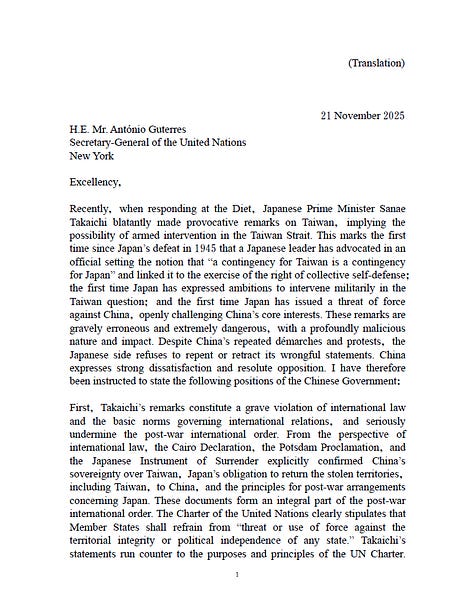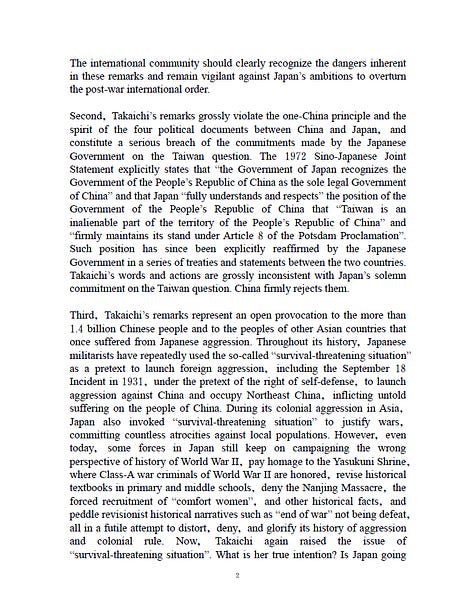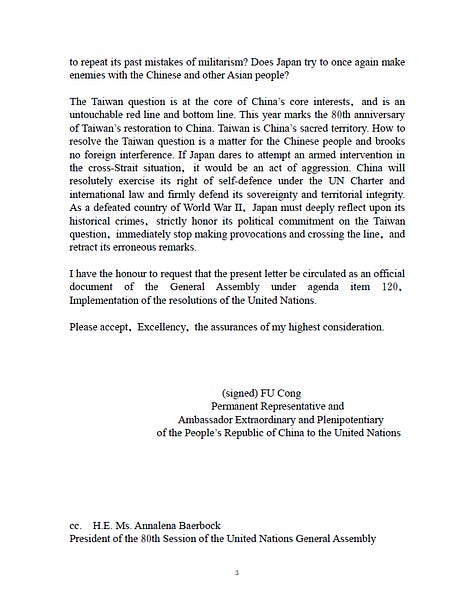Xi-Trump call; PRC-Japan; Getting harder to evade PRC taxes; Sketchy LGFV bond deals
China urges the Japanese side to reflect on and correct its mistakes at an early date and not to be obsessed with its wrong course. If the Japanese side acts willfully and makes mistake after mistake, all countries and people who uphold justice have the right to settle accounts once again regarding Japan’s historical crimes and have the responsibility to resolutely prevent the resurgence of Japanese militarism. - Wang Yi
Summary of the Essential Eight:
1. Xi and Trump have another call - Xi Jinping and Donald Trump spoke Monday. According to the Wall Street Journal, Xi initiated the call. Xinhua took the messaging initiative, issuing a readout several hours before Trump posted to Truth Social about the discussion. According to Xinhua:
Xi Jinping elucidated China’s principled position on the Taiwan question, emphasizing that Taiwan’s return to China is an important component of the post-war international order. China and the United States once fought side by side against fascism and militarism, and currently, we should all the more jointly safeguard the fruits of the victory of World War II.
习近平阐明了中方在台湾问题上的原则立场,强调台湾回归中国是战后国际秩序重要组成部分。中美曾并肩抗击法西斯和军国主义,当前更应该共同维护好二战胜利成果。Trump stated that President Xi Jinping is a great leader. He noted that his meeting with President Xi in Busan was very pleasant and that he completely agrees with President Xi’s views on bilateral relations. Both sides are fully implementing the important consensus reached at the Busan meeting. Trump acknowledged that China played an important role in the victory of World War II and stated that the U.S. side understands the importance of the Taiwan question to China.
特朗普表示,习近平主席是伟大的领导人。我同习近平主席在釜山的会晤非常愉快,完全赞同您对两国关系的看法。双方正在全面落实釜山会晤达成的重要共识。中国当年为二战胜利发挥了重要作用,美方理解台湾问题对于中国的重要性。
Trump made no mention of Taiwan or the “post-war international order” in his Truth Social post about the call, saying that “we discussed many topics including Ukraine/Russia, Fentanyl, Soybeans and other Farm Products, etc.” He also said Xi invited him to visit Beijing in April, and that Xi will come to the US on a state visit later in 2026.
Taiwan and Japan leaders may be justified in being nervous about this discussion, in the absence of more information about what the two leaders really said about Taiwan, and Japan, assuming the current PRC tempest over Prime Minister Takaichi’s comments came up. Xi asking for this call could be a sign he is trying to shape Trump’s reaction to the growing PRC-Japan crisis. So far Trump and the White House have not weighed in publicly on the current PRC-Japan tensions.
US officials have said repeatedly they expect to sign the latest US-China trade deal by Thanksgiving, which is this Thursday, and the PRC is behind on its promised purchases of soybeans. Perhaps Xi also wanted to squeeze Trump for a little more before closing that deal, say around Nvidia H200 chips for soybeans?
2. Wang Yi’s comments about Japan - Foreign Minister Wang Yi spoke with Chinese media after his trip to Kyrgyzstan, Uzbekistan, and Tajikistan. He used the final question to comment on Japan
This year marks the 80th anniversary of the victory of the Chinese People’s War of Resistance Against Japanese Aggression and the World Anti-Fascist War. The return of Taiwan, which was “stolen” by Japan back then, to China is explicitly stipulated in a series of international documents such as the “Cairo Declaration,” the “Potsdam Proclamation,” and the Japanese Instrument of Surrender. This is an undeniable outcome of the victory of World War II and is also an international obligation that Japan, as a defeated nation, must continuously observe. In this critical year, what Japan should do most is to profoundly reflect on its history of invading and colonizing Taiwan, profoundly reflect on the war crimes committed by militarism, and abide by rules and be cautious in words and deeds regarding the Taiwan question and historical issues. However, it is shocking that the incumbent Japanese leader actually publicly sent a wrong signal attempting military intervention in the Taiwan question, saying things that should not be said and crossing red lines that should not be touched. China must resolutely strike back. This is not only to maintain China’s sovereignty and territorial integrity but also to defend the post-war outcomes exchanged for with blood and lives, and to maintain international justice and human conscience…
A person cannot stand without credibility, and a country cannot exist in the world without credibility. China urges the Japanese side to reflect on and correct its mistakes at an early date and not to be obsessed with its wrong course. If the Japanese side acts willfully and makes mistake after mistake, all countries and people who uphold justice have the right to settle accounts once again regarding Japan’s historical crimes and have the responsibility to resolutely prevent the resurgence of Japanese militarism.
3. Fu Cong’s letter to the UN - Ambassador to the UN Fu Cong sent a letter to UN Secretary-General Guterres outlining all the PRC’s grievances with Japanese Prime Minister Takaichi’s comments about Taiwan, and asking that it be “circulated as an official document of the General Assembly.” Is the PRC trying to prepare the UN for military action against Japan, or is this just more lawfare?
Fu Cong’s letter:



Fu’s letter does not raise the “enemy state clauses” of the UN Charter, but as I wrote in the November 19 Sinocism:
The propaganda complex continues to turn out threats against Japan and Prime Minister Takaichi and warnings about Japan “attempting to resurrect militarism and thoroughly break free from the constraints of the post-war system”. Some people have explicitly, a Beijing Daily commentary implicitly, raised the “enemy state clauses” of the UN Charter as allowing “enforcement actions” against an “enemy state” from WWII without prior Security Council authorization. This is classic lawfare. In 1995 the UN General Assembly explicitly stated that the enemy state clauses have lost their practical meaning and should be removed via Charter amendment, though the amendment never happened.
The Japanese Foreign Ministry, in an attempt to push back on this idea, posted over the weekend to X that “a resolution recognizing the so-called enemy states clauses as obsolete was adopted at the 1995 U.N. General Assembly with China itself casting a vote in favor.”
